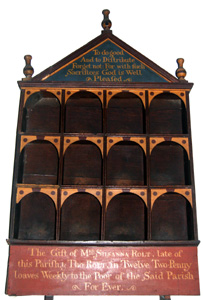Rolts Charity Milton Ernest

The penny loaf cupboard on the north wall of the north aisle February 2011
On the north wall of the north aisle of the church is a splendid piece of woodwork - a wall cupboard with twelve niches for bread rolls. At the top of the cupboard is the following text:
To do good
And to Distribute
Forget not: For with such
Sacrifices God is well
Pleased
Underneath is a statement which reads: "The Gift of Mrs. SUSANNA ROLT, late of this Parish & Tho. Rolt in Twelve Two-Penny Loaves Weekly to the Poor of the Said Parish For Ever". Susanna's will was drawn up in 1720 [OR2071/164].
In 1731 trustees for the charity were appointed by Susanna's son Thomas [CC5]. The deed recites that Susanna established the charity for bread to be given every Sunday to poor people chosen by her son or the minister. She left £5 for one penny each to be spent on "little loaves" but Thomas had decided to increase the size of the loaves to two pence each. The charity was endowed with a cottage and fourteen acres of land in various parts of the parish. The trustees chosen were: John Orlebar of Middle Temple [Middlesex]; Francis Jessop of Bedford; Rev. Stephen Rolt, Vicar of Milton Ernest; Thomas Battison of Milton Ernest; Laurence Clerk of London, distiller and John Grey of Bedford.
By 1965 there were three recipients of the charity and the weekly bill for bread was no longer two pence each but a total of two shillings and three pence, the smallest loaf then costing nine pence [P80/25/22]. The following year the Charity Commissioners proposed that a sum of £95 would exonerate the rent charge on the property (by then part of the Milton Ernest Hall Estate) and wind up the charity. This later rose to £100/5/- [P80/25/22] and, when discharged, in April 1966, the vicar and churchwardens were authorised to spend it as they thought fit, one suggestion being supplies of coal for the inhabitants of the almshouses.